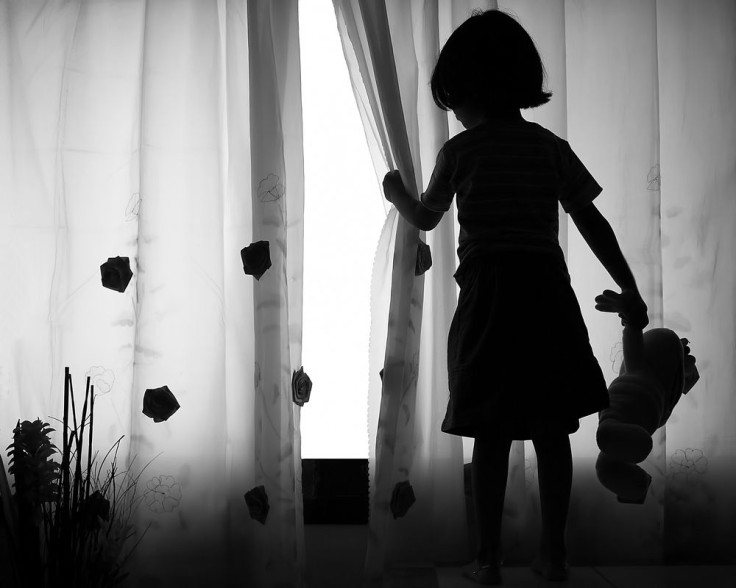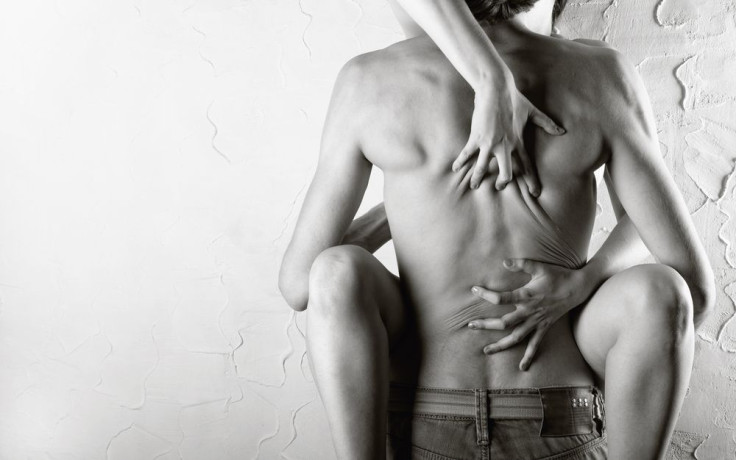The Psychology Behind Angry Sex: Why You Love 'Hooking Up' With Someone You Hate

Hair pulling. Spanking. Slapping. Even choking. The rougher, the better. Maybe you’ve been there. You can’t stand the sight of someone — possibly your ex — but there’s no denying the chemistry that lingers when you spot each other. So, what better way to deal with the conflicting emotions than to channel all of your aggression into a good screw. It might not be the wisest choice at the time, but you act on it anyway. Have you ever wondered why? What makes you succumb to raw hate sex?
The Science Of Instant Physical Attraction
First off, physical attraction is one of the main components of hate sex, also known as the act of having strong, forceful sex with someone you’re attracted to but strongly dislike. (Think Chapman and Vause in Orange is the New Black when they get it on in the library in Season 3.) Visual stimuli greatly influence human sexuality, but from a biological standpoint there are several chemicals that influence your state of mind when you see someone you’re physically attracted to. In fact, when the brain releases these chemicals, your altered mental state makes you behave differently than you normally would.
A 2012 study published in The Journal of Neuroscience found the medial prefrontal cortex, which mediates decision-making, gets more active when you see someone you are physically attracted to. Researchers found when scanning speed daters’ brains, those whose dorsomedial prefrontal cortex lit up were more likely to pursue a date with those they found to be attractive. Another study published in the journal Human Brain Mapping found the brain cells in four regions, including the inferior temporal cortex, right orbitofrontal cortex, left anterior cingulate cortex, and the right insula, alongside the caudate nucleus, released neurotransmitters like the “feel good” chemical dopamine, the “fight-or-flight” chemical adrenaline, and serotonin when participants were physically attracted to someone.
Now, this biological response is independent from whether the person is good or not — we can’t help what we feel. April Masini , relationship expert and author says it’s common for people to be attracted to those they know they’re incompatible with, even if it’s someone they hate.
“Having sex to express feelings — whether the feelings are hatred, sadness, frustration, joy or love — is just a way of connecting. Hate sex is also that — a way to connect over a feeling. It may be that you think it’s hate sex, but it just may be sex over frustration, disappointment, or sadness,” she told Medical Daily.
Childhood Years
Using sex to express feelings, however, may come from releasing repressed feelings from early on. Dr. Fran Walfish, Beverly Hills psychotherapist and author of The Self-Aware Parent, believes the behavior is deeply rooted in childhood.
For example, if a girl grew up with a narcissistic father who was either not around or preoccupied with his career or business, and really jipped her out of full measure of quality of attention, she’s going to start settling for less.
“She’s going to be very familiar with getting less than she deserves with a guy she is attracted to and she’s going to be sexually drawn to and attracted to guys who give her less than a full tablespoon of what she deserves,” Walfish told Medical Daily.

As a result, the daddy issues lead a woman to become angry with men who do not deliver full-measure attention. With time, Walfish explains, women learn to act out on that anger with misdirected sexual aggression.
However, the influence a parent of the opposite sex has on their child and future relationships is also seen in boys. Men who grew up with a mother who is cold, self-centered, or favored the other child tend to be drawn to women who also give them less than a full tablespoon, according to Walfish. In a relationship, the sexual energy revs up in the beginning, but once he gets in the relationship past four months, he starts to look beyond the sexual chemistry and begins to see what’s there and what’s not in the overall relationship.
“He becomes resentful and can often project anger on his mom onto his girlfriend,” Walfish said.
This coincides with a 2010 study published in the journal Child Development that found children, especially boys, who have insecure attachments to their mothers in the early years tend to have more behavioral problems later in childhood. These behavioral problems such as aggression or hostility were seen even years later. Requests that are discouraged rejected, or responded to inconsistently are what make children vulnerable to developing behavioral issues that tend to resurface in intimate relationships with the opposite sex.
Dr. Ben Michaelis, a clinical psychologist in New York City and author of Your Next Big Thing, believes these behavioral problems can also affect their perception of women. “As far as I can tell, hate sex fantasies exist primarily in men. Any man who would pursue this probably has a low opinion of women, or certainly the woman that he may be fantasizing about,” Michaelis told Medical Daily.
Hate Sex Vs. Make-Up Sex: What’s The Difference?
So, what about women with the same fantasies? Girl-on-girl action, to be specific. This brings us back to Chapman and Vause in OITNB. Two inmates played by Taylor Schilling and Laura Prepon, who share a hate/love relationship as it is, ferociously get it on in the library. It involves slapping, pushing, and rough-handling, but the roughness itself gets them going. The scene clearly demonstrates hate sex, although some viewers might argue, in a way, it was also make-up sex. But what’s the difference, anyway?
“Whatever energy you use — the expression is just as important as the direction or the format the energy takes,” Masini said.
Hate sex and make-up sex are similar in the sense they are both fueled by intense emotions. According to Dr. Hillary Goldsher, a Beverly Hills clinical psychologist who specializes in relationship therapy, make-up sex (in theory) is between two people who have an emotional, intimate connection come together after feeling separated by a disagreement. “It is one of many appropriate ways to reestablish a sense of unity after an argument,” Goldsher told Medical Daily.

The intensity of make-up sex reflects the fear of losing intimacy in a relationship, but it provides the foundation to reunite and reconnect after a fight or a break-up. Couples may also be more likely to engage in make-up sex because it provides a certain high like cocaine, according to clinical psychologist Seth Meyers in blog for Psychology Today titled "Make-Up Sex Hurts: Why and How to Avoid It."
Although make-up sex can be good as long as it follows verbal communication and discussion, it should not be in lieu of. Meyers believes couples who use make-up sex inevitably use it as a band-aid for bigger intimacy issues. This creates the illusion that sex can resolve relationship problems, but this only leads to more dissatisfaction and disappointment.
High On Hate
No one wants all that baggage. What’s more appealing, to some, is achieving the same high with hate sex that Meyers describes couples experience with make-up sex. Tugging on your partner’s hair and slapping them around may give you a rush far different from any vanilla sex you’ve had before.
It’s that adrenaline rush people crave and crossing boundaries they normally wouldn’t with conventional sex. In short, they feel uninhibited and alive. For some, hate sex also replaces feelings of anger and vulnerability that are difficult and painful to tolerate. People with unresolved issues associated with low self-esteem and abandonment might use hate sex to feel a short-term sense of power and feeling wanted. “The respite from the painful feelings is usually the catalyst for participating in hate sex,” Goldsher said.
Now, whether you choose to do it can be risky. People who are able to have hate sex, recognize it for what it is and are able to make logical decisions about relationships. However, Masini warns, “when people have hate sex and think it means something other than what it is, it’s not so healthy.” Engaging in hate sex or any hook up sex and thinking it means love or a committed relationship will only lead to being disappointed and depressed.
So while it may be a high or form of release, if you don’t know what you’re getting yourself into, hate sex may very well be a misguided way of dealing with your emotions.
Or it may lead to one of the best orgasms of your life.



























